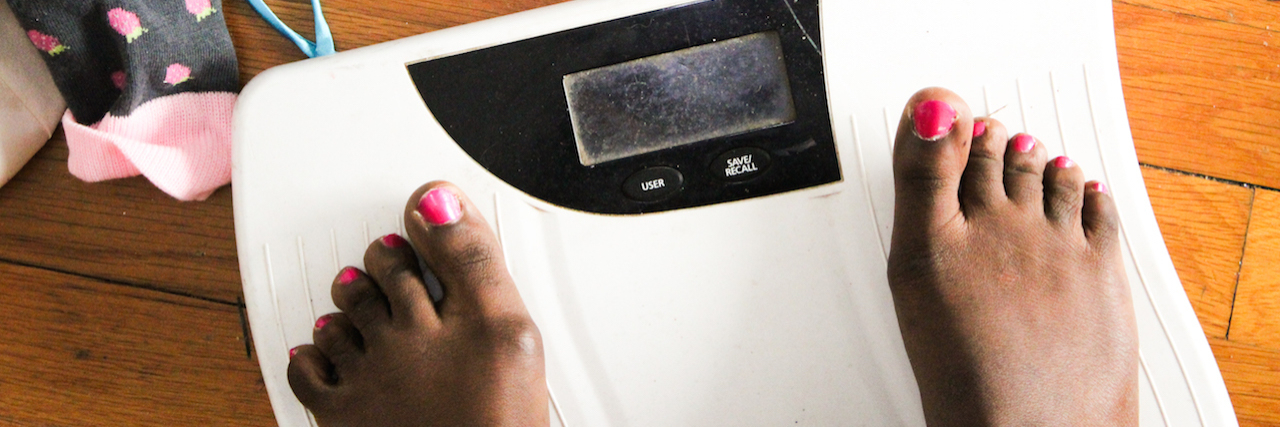What do you do when you’re a Black girl who isn’t thick? You’re not slim thick either. You’re just slim. You pray that maybe you still have a cute ahhhh (y’know, slim thick witcho cute ahh…), but due to your body dysmorphia you’re not really sure what to think.
The image of the beautiful Black woman that was fed to me growing up was someone who is cornbread fed, with thick thighs, a big Nicki Minaj butt, small waist with a flat stomach and large boobs. They’re the girls you see in music videos. They’re the girls who are applauded for their bodies, even though without a doubt they’ve probably had to fight tooth and nail to love themselves just as much as anyone else.
I’m a skinny Black girl. I acknowledge that I have a lot of privilege with my size. I will never struggle to see my body type represented in the media. I can find clothes that fit me in every single store. Society refuses to accept women’s bodies regardless of size, but they will always accept mine first and I acknowledge my privilege. I am speaking to my experience and my experience only.
I’m a skinny Black girl who has always been told that I don’t have a “Black girl body.” I was always told I don’t have that Black girl butt. I was told I had the body of a white girl. In the same breath as I’m eating a 12-inch sub, I’m told I need to not eat so much or else I’ll get fat, and the way they said fat was with such misplaced disgust and hatred.
As I developed, I had male family members telling me how I was finally starting to mature, bringing attention to the small 18-year-old butt that I had. Two days later, I had other family members telling me that I was as flat as a board, negating the somewhat creepy comments my male family members would leave.
One minute I was too small, and not womanly or Black enough, and the next I wasn’t watching what I ate, so something horrible (which was gaining weight in their eyes) was on the horizon.
This back and forth happened for years with friends, peers, and family, and when you’re a teenager just starting to develop your own sense of self, you don’t know what to believe.
Slowly, the way you start seeing yourself is warped. You don’t know how to see yourself. Do you see yourself as someone who is finally getting a butt that jiggles if you shake it just so? Or do you see yourself as someone who is too thin, dangerously thin. Should you eat more and put on more weight to be slim thick? Or should you stop eating to begin with?
Not only was I dealing with misogynoir, but I was also dealing with the hyper-sexualization of my Black body by others both Black and non-Black. To be continually told your body isn’t right due to the fact that you’re Black and then told it is right by society because you’re skinny is this weird yo-yo effect that is impossible to navigate.
My body dysmorphia started at age 10.
My disordered eating habits started at age 12.
My eating disorder started at age 17.
Once my eating disorder truly developed, I felt this weird level of relief. I found an outlet for all the criticism of my body. I found a way to control what goes in and what comes out. My body was my body, and this was my way of reclaiming it.
But then, even after I started the road to recovery, I heard it.
“Black girls don’t get eating disorders.”
I looked down at my skin, checking to make sure I was just as dark and african-american as I remembered I was.
Yep, still Black, and still suffering from bulimia nervosa, and an Eating Disorder Not Otherwise Specified, with habits such as chewing and spitting and restrictive eating. That was very real in my life. It was the biggest demon I have yet to battle and the battle continues. Yet this person looked me in the eyes with merriment and mirth and said it as if it was a fact or a joke.
I was Black, so I couldn’t have an eating disorder.
This is a continuation of the prolonged and needed conversation of Black people and our mental health battles.
Black people, especially Black women, are gaslighted to extreme extents. Mental illness can manifest in different ways — including but not limited to quietness, irritability, confusion, hysterics and mania, but our mood swings that are due to mental illness are often just blamed on us having “attitude problems.” Our cries for help are ignored. Black women are dying because the world refuses to allow us the privilege of having mental illnesses that need to be treated. We’re just expected to brush off our moods and carry on like the strong Black women society says we are when we are just as human as any other race or gender.
Black girls do have eating disorders. Small Black girls have eating disorders, and large Black girls have eating disorders. There’s no criteria for who is susceptible to have one.
We need to stop ignoring Black girls when they say something is wrong. The signs are always there, but they’re masked by melanin coated prejudice.
Black girls have eating disorders, too, and if you are a Black girl out there struggling with your own ED?
You’re not alone.
Recovery is possible.
Your mental health is valid, and I love you.
We want to hear your story. Become a Mighty contributor here.
If you or someone you know is struggling with an eating disorder, you can call the National Eating Disorder Association Helpline at 1-800-931-2237.
Lead image provided by contributor

